 Are you a hotel owner struggling to stand out online?
Are you a hotel owner struggling to stand out online?
Let’s say, you have a cozy hotel in a bustling city that offers breathtaking views and exclusive experiences, but not many people know about it online.
in a bustling city that offers breathtaking views and exclusive experiences, but not many people know about it online.
If you’re not on the first page of Google, your audience is unlikely to find you, and you’re losing potential direct room bookings through your website.
 According to statistics, websites on the 1st Google SERP (search results page) get 92% of all traffic. If your hotel doesn’t appear on the first page of SERP, the chance that your potential clients will find it is less than 6%.
According to statistics, websites on the 1st Google SERP (search results page) get 92% of all traffic. If your hotel doesn’t appear on the first page of SERP, the chance that your potential clients will find it is less than 6%.
Look no further. We’ve got practical hotel SEO tips to help boost your hotel’s visibility and attract more guests. From optimizing your website to ranking higher on search engines, let’s dive into the world of hotel SEO together.
What is Hotel SEO?
Hotel SEO is a broad term that encompasses all SEO techniques that can be used to improve the ranking of a hotel website in search engines (like Google, Yahoo, and Bing). Hotel SEO techniques are the best solution to attain the greatest ROI and a valuable online presence.
Using our full data set of ~4 million Google results, FirstPageSage & Backlinko found that the #1 result has the highest CTR. You will lose potential customers/clients if you do not achieve that first position.
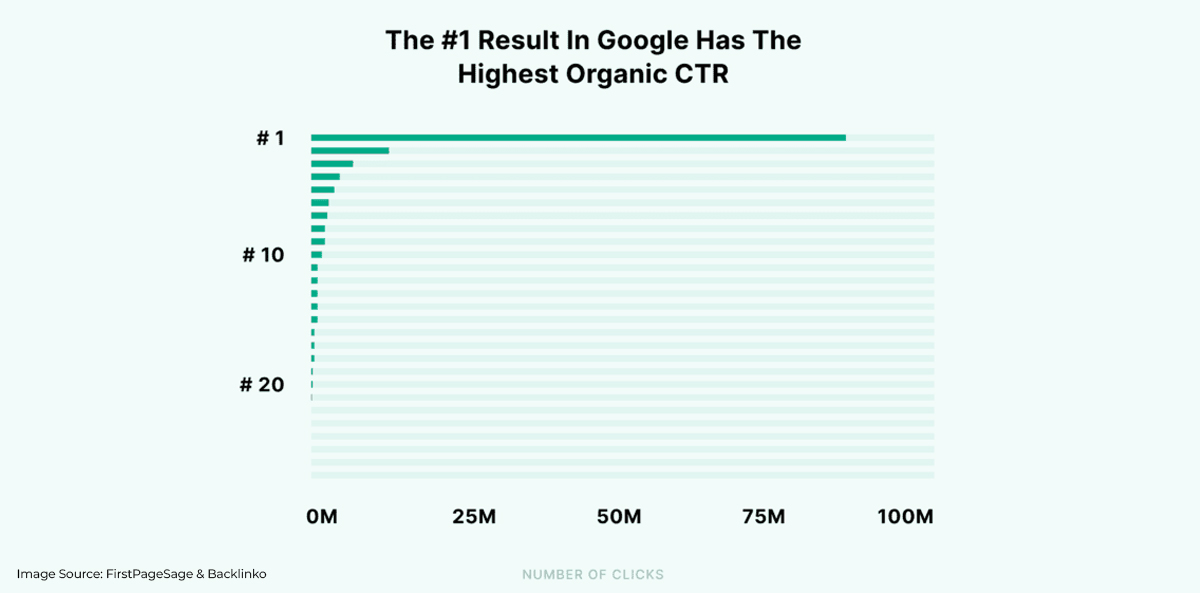
Hotel SEO can include, but is not limited to, on-page SEO such as title and meta descriptions, local listing site optimization to ensure all relevant information is accurate & up-to-date, off-page SEO to improve online visibility, and more. You can do many other things to get your hotel website to rank on the first-page search engines. With hotel SEO strategies, you’ll:
| Attract & accommodate many guests. | Ranking in Google’s map pack top 3 positions. | Improve brand awareness & book more online reservations. |
| Enhance current click-through rates & conversions. | Target customers in your local area and gain a competitive edge. | Improve customer satisfaction & get positive reviews and ratings |

There are plenty of SEO strategies for hotels that could help your hotel business become popular in search engines. SEO services for hotels are becoming crucial due to the increasing competition and marketing trends.
Why is hotel SEO so important?
SEO is significant for any business that operates on a transactional basis. One of the best ways to acquire direct bookings via your hotel website is by ranking high on search engines. Search engine optimization (SEO) is an integral part of all hotel digital marketing and one of the most effective ways to win over your competition.
Given that websites on the Google first page receive more than 90% of traffic, it’s crucial to have an SEO strategy to get you there. Benefits of strong hotel SEO include:
- Organic traffic/bookings from SEO is free & evergreen
- SEO is great for targeting high-intent users. If they are looking for nearby hotels, activities, or attractions, it is obvious that they want to come to your city and be a paying customer at a hotel.
- SEO might be the most important it’s ever been, with reports indicating that searches for hotels and resorts are higher now than in the past decade.
- SEO can deliver commission-free bookings when travelers visit your website from Google
- Beating out the competition isn’t easy. It will take time, but if you do it right, you’ll be able to win more bookings than your competitors with fewer dollars spent on marketing.
How fast does Hotel SEO work?
The correct answer to this question would be – “It depends.”
Hotels can start seeing results of SEO activities in as little as 2 months if done right. If a knowledgeable SEO team is supported with a reasonable budget, it would be safe to assume that in 2-6 months, one can start seeing the results of the SEO activities.
The key to measuring the success of any SEO activity is setting up realistic goals. Setting realistic goals followed by the actual work aligned with best practices ensures any hotel can see the benefits of search engine optimization.
10 Proven Hotel SEO Tactics To Boost Direct Hotel & Resort Bookings
To rank highly in search engine results pages (SERPs), you need to understand the fundamentals of SEO. Here are the top factors and components to keep in mind when creating your hotel website:
1- Architecture of Your Site
The foundation of your hotel SEO strategy is building a user-friendly website architecture to ensure visitors get what they want.
SEO pairs the website address (domain name), the website’s internal code, and your site’s content with the keywords that users search for in Google.
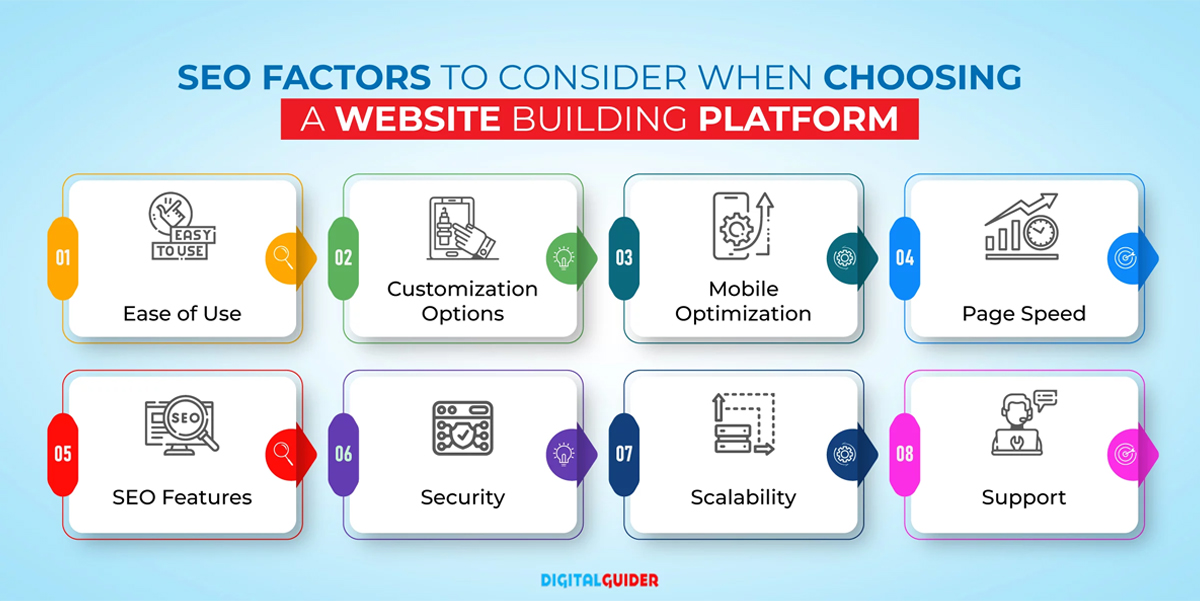
Remembering that a webpage is visually different from a search engine crawler and the human eye is important. The key is to structure your site so that search engines and human users can both find and read your site.
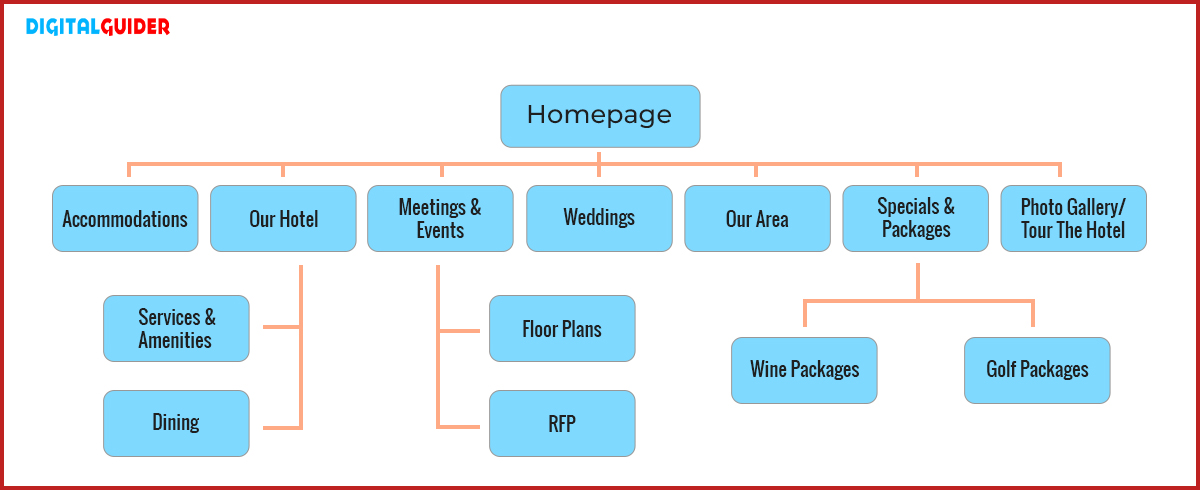
Before you start creating amazing content and attempting to build links, you need to focus on the following things:
- Site speed. Visitors are unlikely to stay if your hotel site is slow. Ensure your website loads quickly on different mobile devices, as mobile-friendly websites rank higher.
- Server errors can include 500 & 404 errors. They make your website’s visitors frustrated, & chances are they’ll never return. Ensure no server errors on your website.
- File naming. Name the site files correctly and make sure they are located in the correct places. Don’t leave site images with their default name on your website.
Recommended Blog: How To Make A Responsive Website? 8 Practical Tips To Follow
2- SEO keywords for hotels
Keywords are the phrases searchers might use to find your brand website. Instead of using generic keywords like “hotel”, opt for descriptive hotel keywords unique to your business and location.
For example, we are searching for an “eco-friendly bed and breakfast in Times Square.”
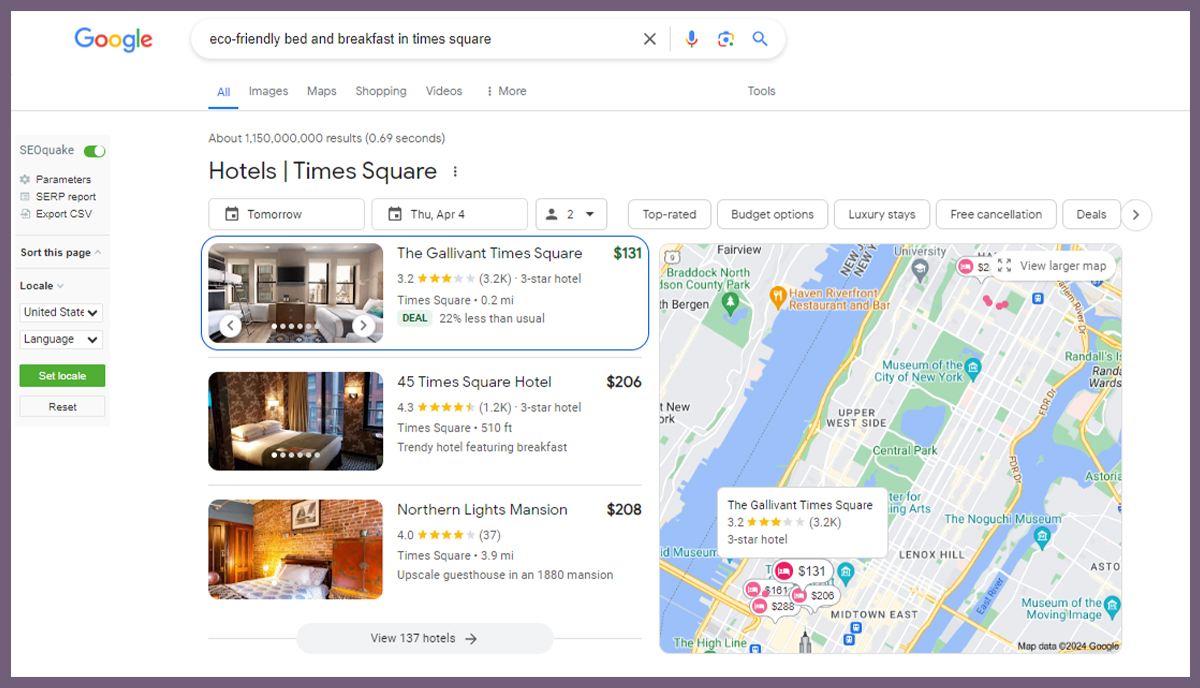
You can see the variety of meta titles & meta descriptions shown in the image below to rank on top of SERP.
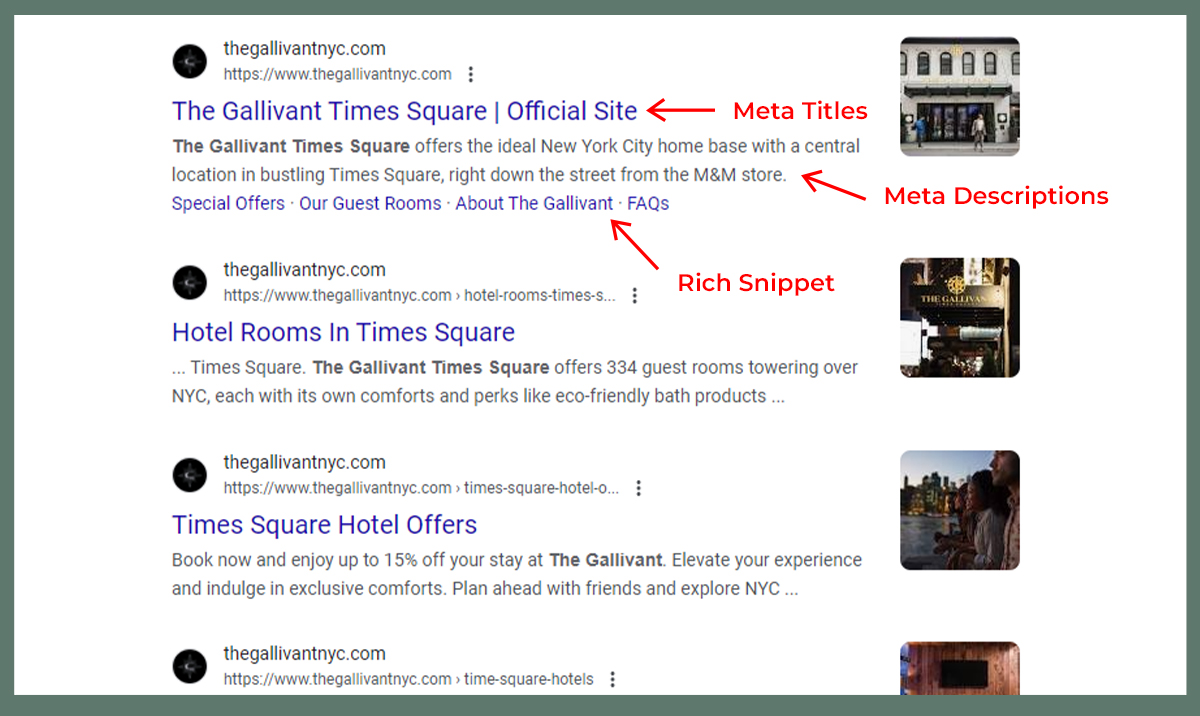
Incorporating LSI keywords naturally rather than ‘stuffing’ them in is important. Also, make sure to include relevant hotel-based keywords in your website metadata:
- Meta title: The website page title within its HTML code. It is the title search engines use when they link back to your page. Your meta title should be within 60 characters.
- Meta description: The meta description provides search engines comprehensive information about the site page. It influences user experience (i.e., how likely someone is to click). Your meta description should be within 155 characters.
Must Read Blog: Keyword Funnel In SEO? What It Is & How It Works
3- Content on Your Site
Ensure that your site’s content provides visitors with the information they need to make an informed decision about booking your hotel.
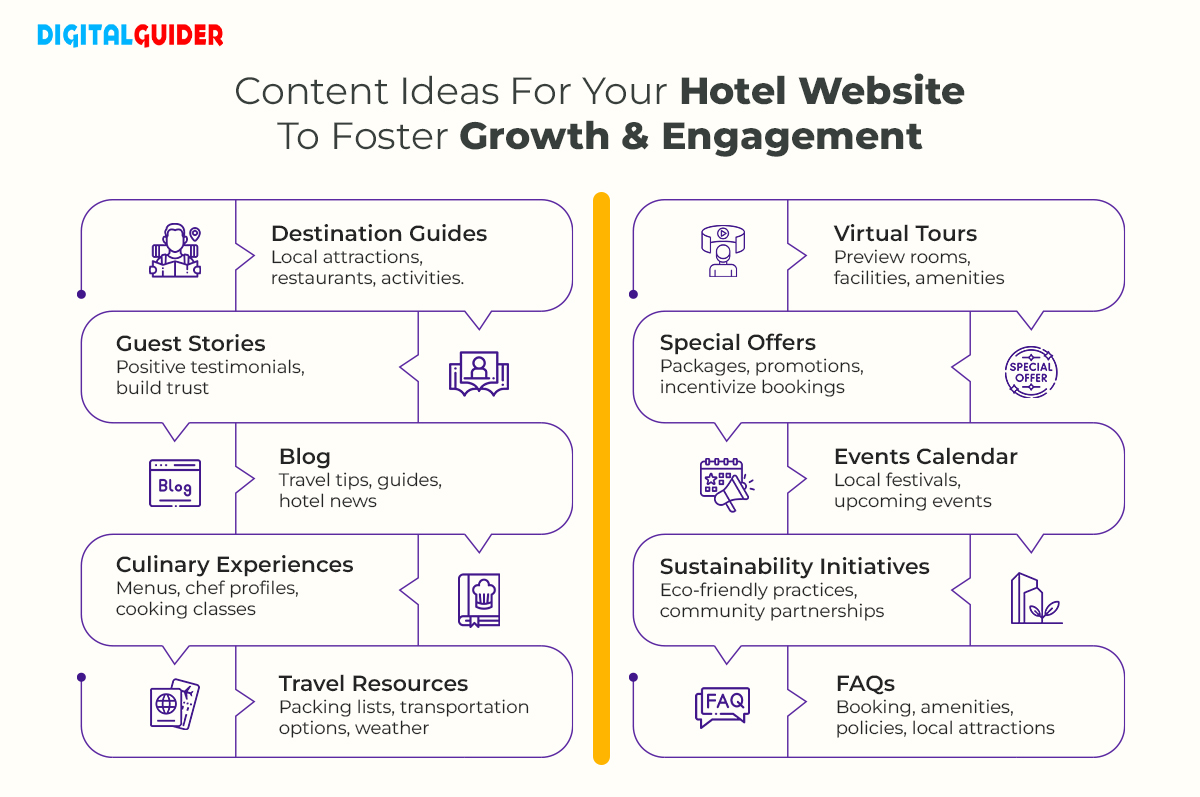
A content marketing strategy is one of the most effective ways to enhance your hotel’s SEO. Good content will help you rank higher on search engines and build relationships with hotel website visitors. Here are some tips to help you get started.
- Remember that longer blog posts typically perform better.
- Write blogs for people and not for search engines.
- Create informative & EEAT-based blog posts that attract internet users searching for trustworthy information or trying to find something online.
- Choose the most relevant topics for your target audience.
- Ensure you keep your content up to date.
- Use important keywords in headings and subheadings.
- Instead, you should focus on long-tail keywords, which are more likely to be used by searchers when they are more likely to make a purchase decision. This will result in more qualified traffic and more bookings.
- Focus on 2 or 3 significant keywords that are relevant to your topic.
- Do internal links to other content on your site.
- Optimize your titles and descriptions – include keywords you are targeting and your brand’s name.
- Add keywords in the image name and attach ALT tags.
See the image below where the hotel site is providing valuable content to their visitors & growing brand awareness at the same time.
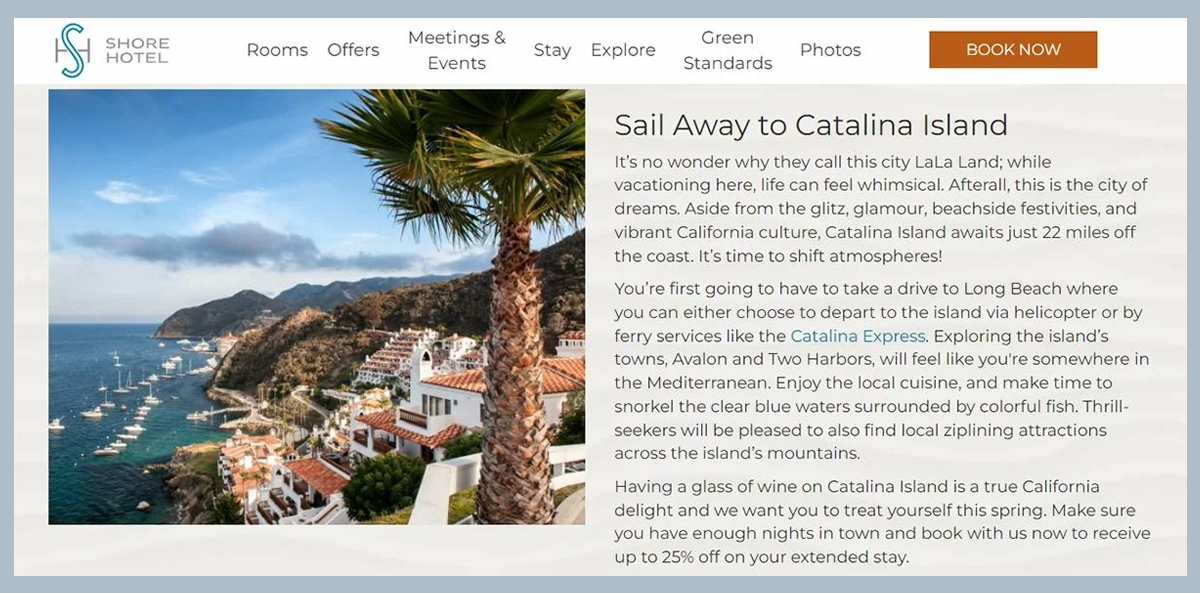
Search engine AI algorithms highly value Fresh and unique content, which ranks it higher in the SERPs. Following best SEO practices is essential to create high-quality content that’s easy to read, navigate, and valuable to your hotel website visitors. Relevant and exciting content has a higher chance of getting more links and social media shares.
4- High-Quality Hotel SEO link-building
SEO is the submergence of multiple services that aim to take a website’s ranking from nil to above the top hill. Link building is one of its manifold services. Two types of links are important for SEO:
- Internal links: These are links between pages on your website, such as links from one blog to another.
- External links: These are external links to your website from other websites. The higher the number of external links you get, the better your site will appear to search engines.
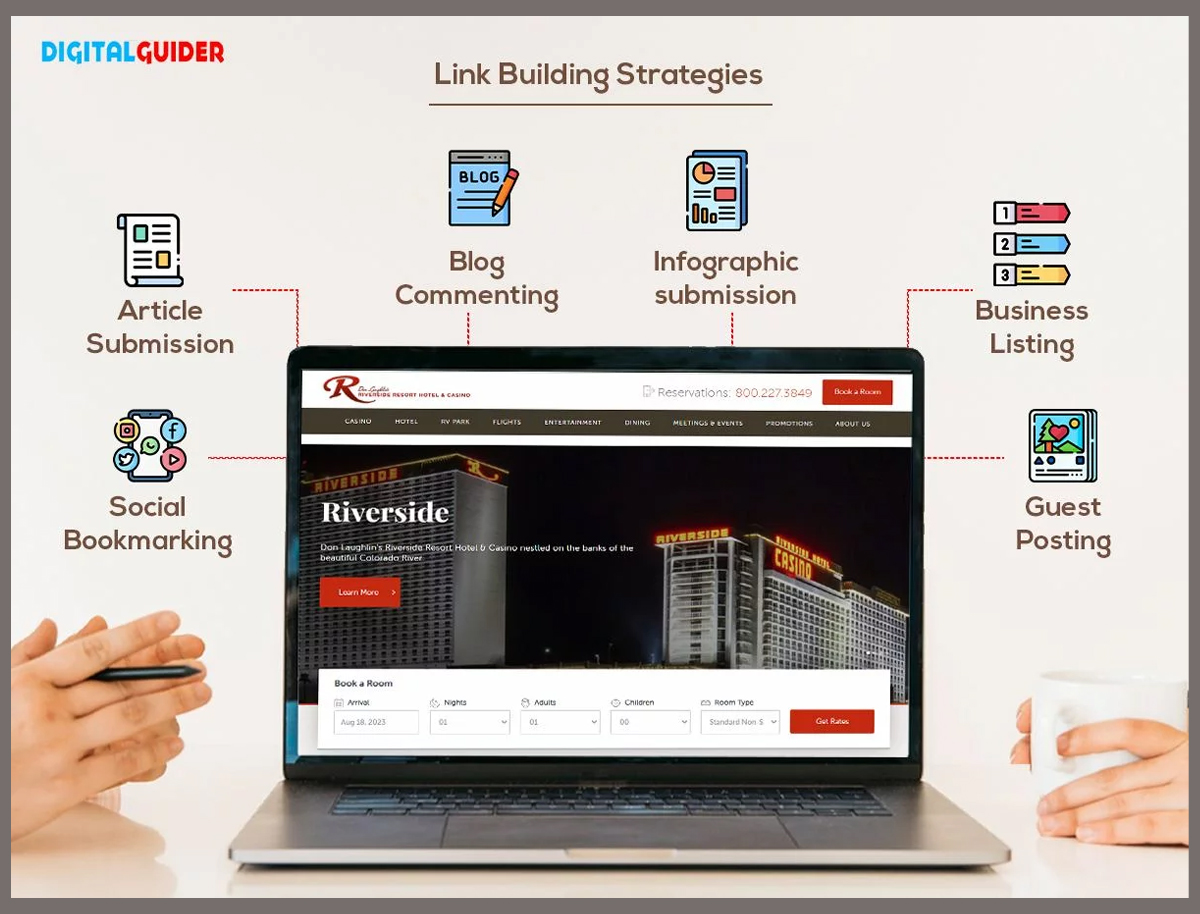
Google considers backlinks to your site signs of value and trust, and it’s the best way to get your clients to trust your brand. Different ways to generate quality backlinks include creating viral content, guest posting, manual outreach, etc.
Google+, Facebook, LinkedIn, and Twitter- each social media network has different types of customers and influencers. Quality likes and shares from these influencers can take your hotel’s SEO to a new level.
SEO tips for hotel link building
- Link to other pages within your site, such as business blogs, a Contact Us page, landing pages, or a booking page.
- Contact local travel sites & tourism experts and encourage them to link to your property for thematic linking.
- Get listed on Google, TripAdvisor, Yelp, and any other popular directories in your region.
- Sign up for social media sites your guests use, like Facebook, Instagram and Twitter.
Also Read: What Is Barnacle SEO? 11 Tips to Leverage Other Sites’ Ranking & Traffic
5- Create a ‘Google My Business’ account
Google My Business is a free listing platform that optimizes all your hotel’s information into the right fields & makes it easier for travelers to get the details they want about your hotel. This includes your hotel’s address and phone number, Google Maps geo-marker, hotel photos, guest reviews, and other relevant information such as amenities.
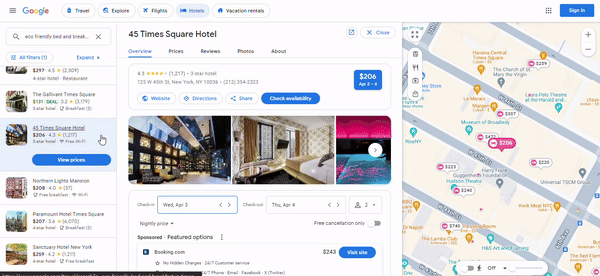
Providing you complete your listing properly with the above features, Google My Business makes your hotel website instantly more accessible to travelers searching on Google.
Recommended Blog: What is Hyperlocal Marketing Strategy – Boost Your Business Locally
6- Apply Multi-Language SEO
It is not obvious that only national travelers will approach your hotel or restaurant. There is a high likelihood that your website will be visited by people who don’t speak English fluently. Every piece of English-language content on your site can drive these people away. However, the multilingual SEO that we do stands out from the rest.
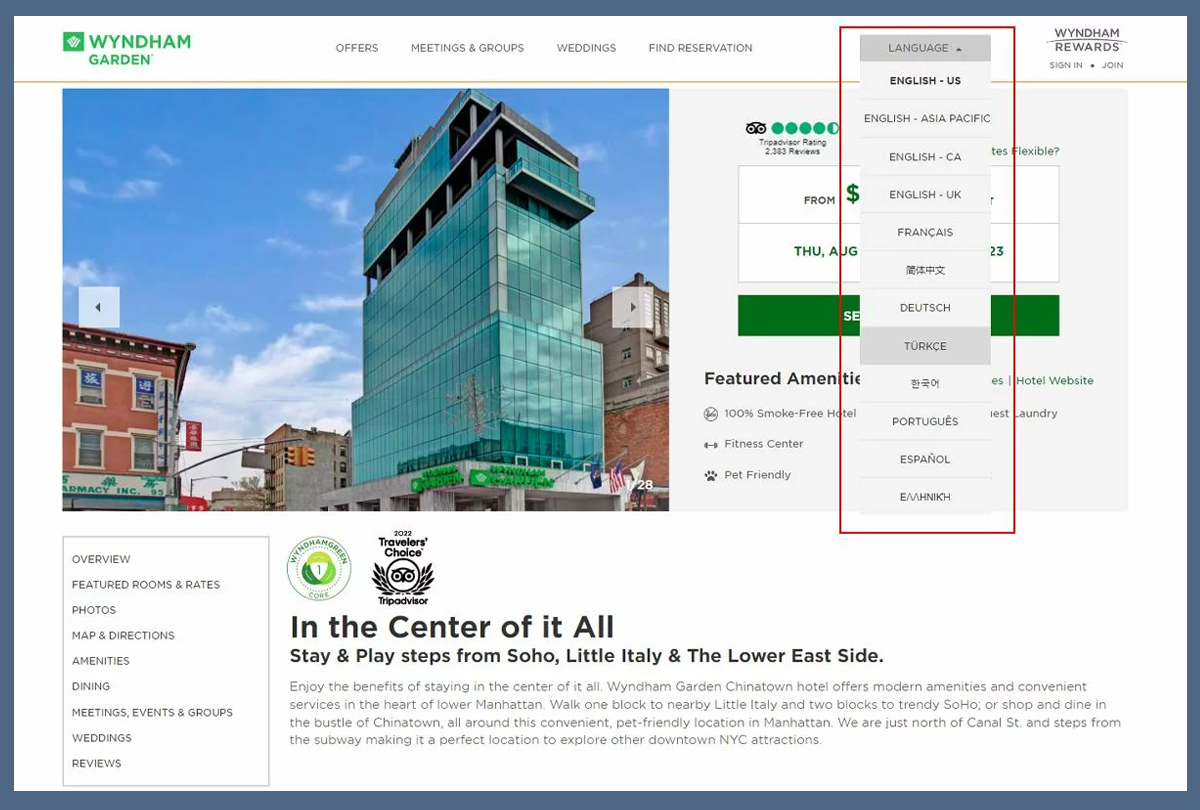
The content we optimize is in multiple international languages so that people from abroad can thoroughly engage with what you offer and, thus, cherry-pick your top services.
7- Check Website’s Technical Health & UX
Technical SEO focuses on optimizing the technical aspects of their websites to improve the website’s technical health, search engine visibility, UI, and user experience.
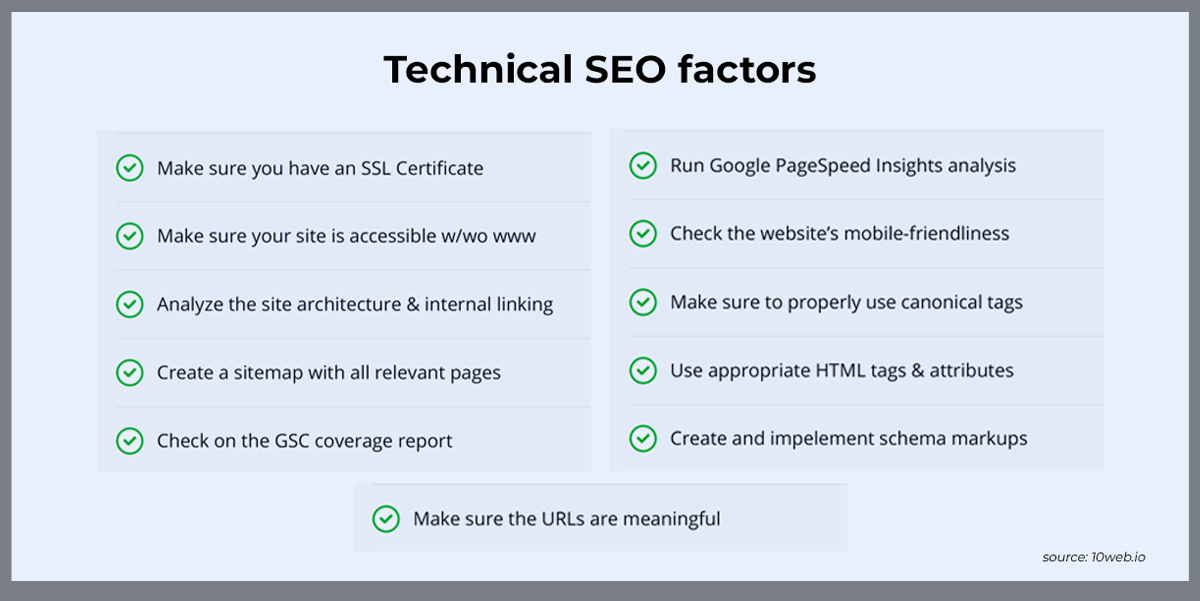
By implementing effective technical SEO strategies, hotels can ensure their websites are appropriately crawled, indexed, and accessible to search engines and users.
8- Brand Identity & Reputation
Online Reputation management is the procedure of influencing what people think of your brand & taking strategic action to affect your brand’s image. The hotel’s reputation and image are crucial for its survival and growth. If you are not receiving any ratings & reviews, then you need to strategize to get them from your visitors. Some of the primary benefits of online reputation management are:
- Enhances brand image
- Builds customer trust
- Mitigates negative reviews
- Increases credibility
- Improves customer satisfaction
We manage the online reputation of prestigious hotel companies wishing to enhance their brand name. See the example below how this hotel receives positive reviews that can attract more customers to this hotel.
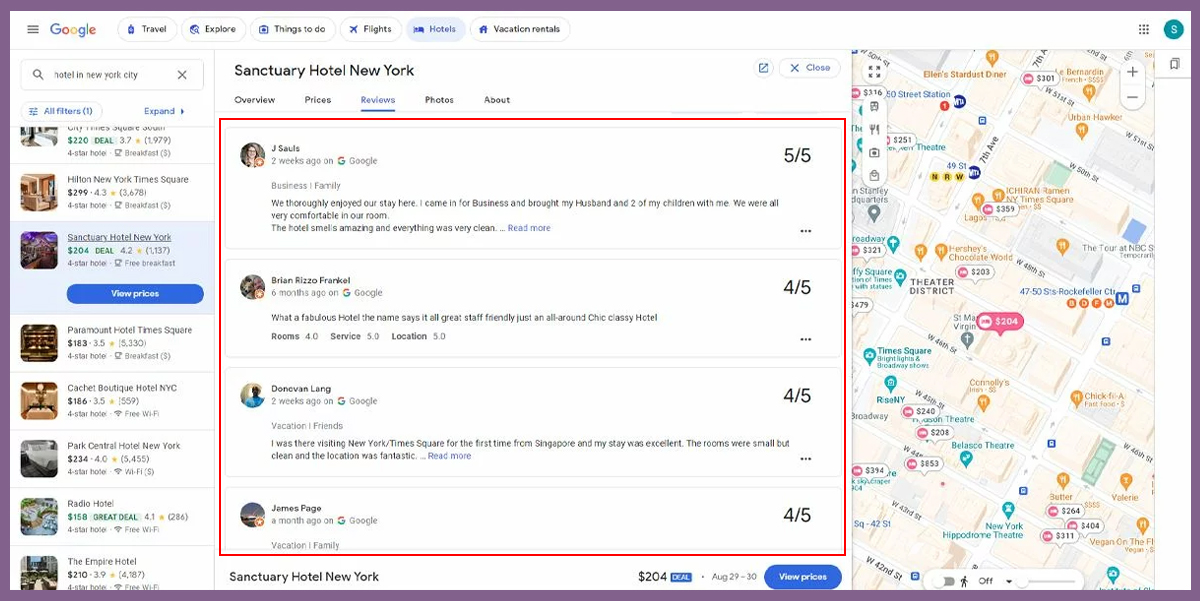
Make sure you gather reviews & ratings (as shown in the image above), as they can help you grow your business to the top. Our ORM services are meant to take your brand name up in the market, and the means of SEO we adopt are white hat and search engine-friendly.
9- Add Relevant CTAs
They are just browsing around, comparing rooms, and using your site to learn about things to do in the area. The key to converting travelers into actual guests is to have a strong call-to-action (CTA) that is easy to understand and speaks to the action you want them to take, such as “Book Now.”
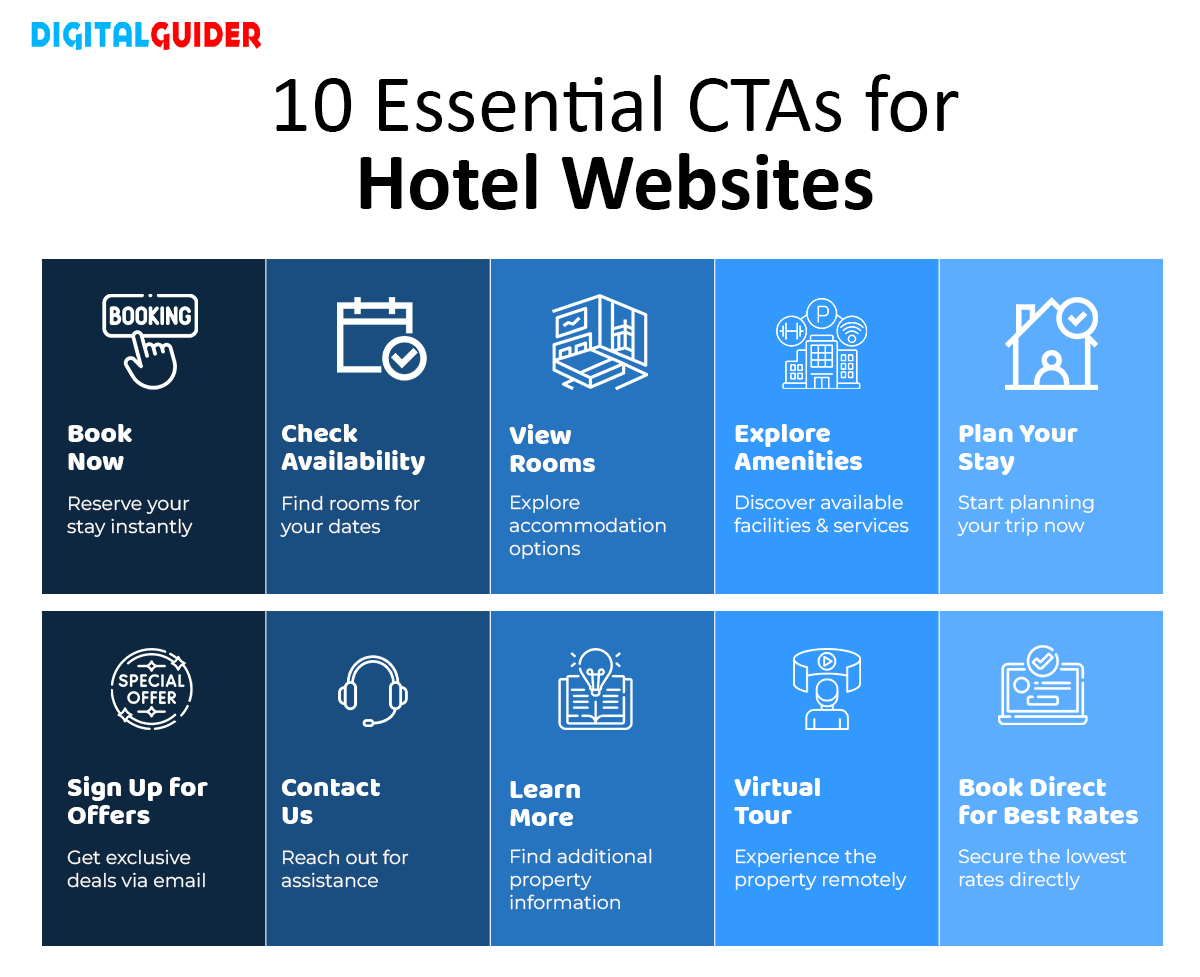
Make the Call-to-Action (CTA) stand out on the homepage with clear buttons that look like buttons. Use color contrast, size, whitespace, and directional cues. Ensure the CTA is visible without scrolling (best practices for CTAs apply).
10- Engage the Audience Through Social Media
In today’s digital age, social media is essential to any hotel, resort, villa, Airbnb, or other accommodation type. Social media platforms allow your hotel to engage with your target audience, share valuable content, and establish a robust online presence to attract more visitors.
Using ROI-focused hotel SEO strategies, you can leverage social media to increase your room bookings. You can see in the image below how hotel owners engage & post their hotel & resort images to attract travelers.
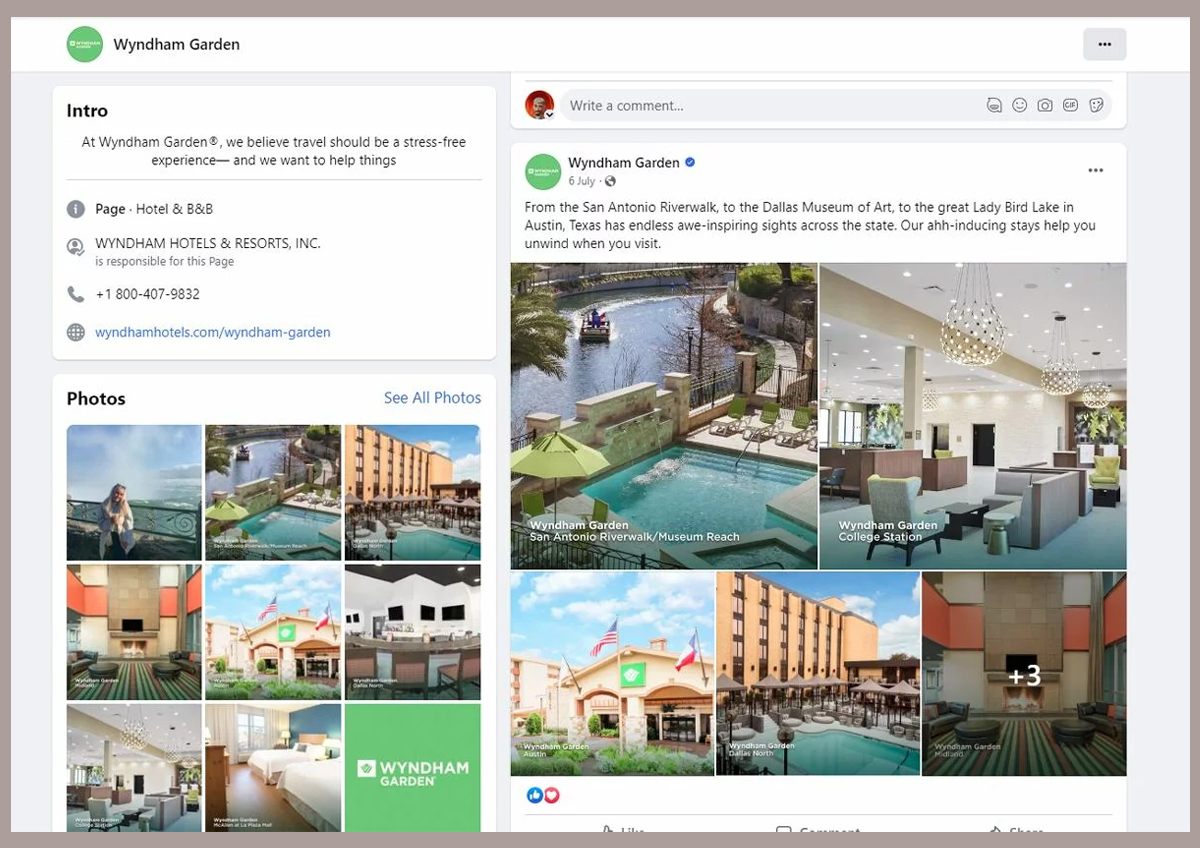
Social media platforms like Instagram, Facebook, and Twitter allow you to showcase your hotel stories, facilities, offers & more. Creating influential and shareable content can increase brand awareness and attract a larger audience to your hotel.
To Sum Up:
Using online travel agents to fill your hotel rooms may seem like a good idea. But it can lead to higher costs, more effort, and lower profits. To maximize your ROI and profits and improve your bottom line, consider managing your entire demand generation and sales process through your own website & social media.
Moreover, Digital Guider, a leading hotel marketing & SEO agency, can help you achieve your goals fast. We’ll help your hotel business get more bookings and sales and grow faster with our proven hotel digital marketing services. Get started by giving us a call today at @+1-307-209-3608
The post Hotel SEO Strategy – A Comprehensive Guide appeared first on DigitalGuider.
Source: digitalguider.com




